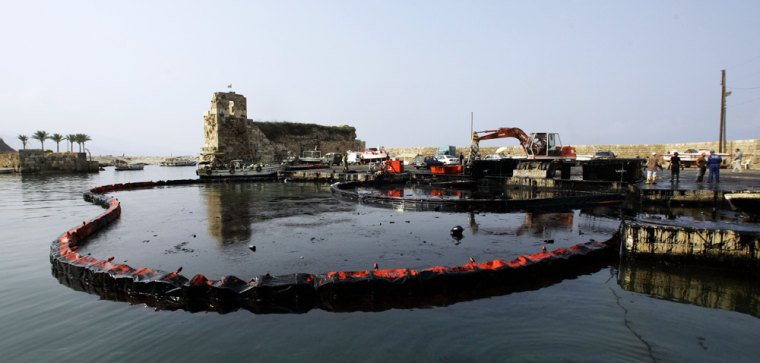What has been described as Lebanon's worst-ever environmental disaster — up to 15,000 tons of oil that spilled into the Mediterranean Sea — is finally being dealt with four weeks after the fact.
President Bush on Monday announced a spill response team was being sent to the region, and Europe and the United Nations last week also promised to help Lebanon clean up the slick, which was caused when Israel bombed a power plant near Beirut in mid-July, destroying oil storage tanks.
In addition, Israel gave U.N. environmental experts permission on Monday for an aerial survey.
“I would like to acknowledge the response by the Israeli authorities giving safe and secure passage of aerial surveillance flights,” said Achim Steiner, head of the United Nations Environmental Program. “It is absolutely vital that these are swiftly undertaken to establish the quantity of oil still floating on the sea and to thus tailor the proper cleanup response.”
Experts say it could take up to a year to clean up the spill a cost of more than $65 million.
By last week, the slick had polluted an estimated 85 miles of shoreline as it drifted east, according to U.N. estimates.
The spill threatens marine species such as bluefin tuna and sea turtles, including the green turtle which is endangered in the Mediterranean. UNEP has said it also has humanitarian and economic implications, by robbing fishermen of their livelihoods and discouraging tourism.
Lebanese Environment Minister Yacoub Sarraf said the full extent of the crisis was impossible to gauge because an Israeli air and naval blockade prevented both a full survey of the damage and a serious clean-up.
Sarraf has called the spill the biggest environmental catastrophe in Lebanon’s history. UNEP has compared it with a disaster off France in 1999, when the tanker Erika spilled an estimated 13,000 tons of oil into the Atlantic Ocean.
Officials from UNEP as well as the U.N.'s International Maritime Organization and the European Union said they would appeal for international financial assistance to contain the spill.
$13 million from Europe
Pia Bucella, a representative of the EU environment commissioner, said the agency would give Lebanon $13 million in initial assistance.
UNEP offered $400,000, and OPEC an initial $200,000. Cleanup equipment from Norway has already been deployed in the area.
Steiner said last week that the cleanup had been seriously delayed by Israeli airstrikes that lasted for four weeks after the power station was bombed. Hostilities ended Aug. 14.
"This is a ... major environmental emergency," Steiner said. "I'm not aware of any incident with such a four-week delay."
Steiner added that the spill was a threat to the wider region and the cost of recovery was rising.
"It may still affect others. It may still spread further," he said. "The situation retains an element of utter urgency."
"To this day we cannot tell you with any accuracy what amount of oil remains off the sea. We have been condemned to working with satellite images and ad hoc observations because access to the area has been impossible in terms of aerial surveys," Steiner said.
80 percent on coastline
Officials said some local groups had already started to clean up beaches but a larger effort was needed to prevent the spill from reaching marinas and beaches in Cyprus and Turkey.
It is believed about 80 percent of the oil is on the coastline, 20 percent has evaporated and less than one percent is at sea.
A U.N. action plan envisions about 300 people working at 30 cleaning sites, disposing of waste either by burning it in refineries or possibly using some in public works such as road construction.
Officials said no timetable had been agreed for the action plan because it hinged on securing funding from governments, companies and organizations.
